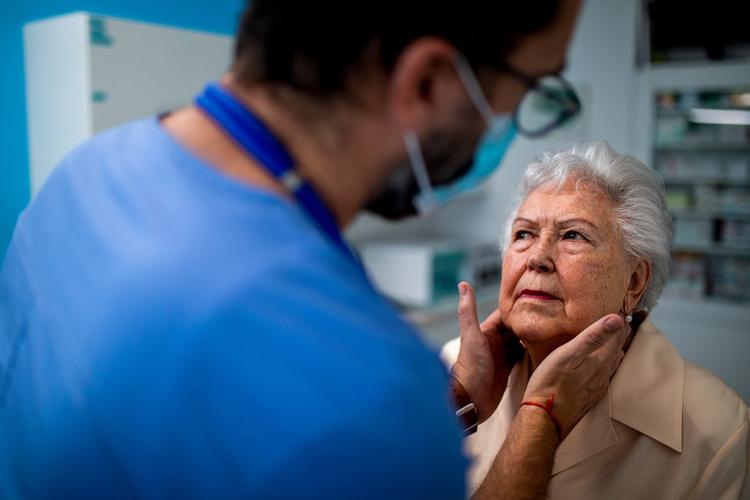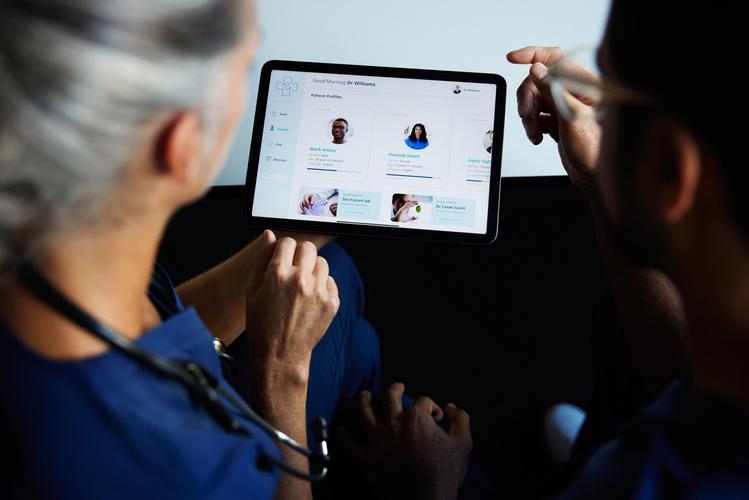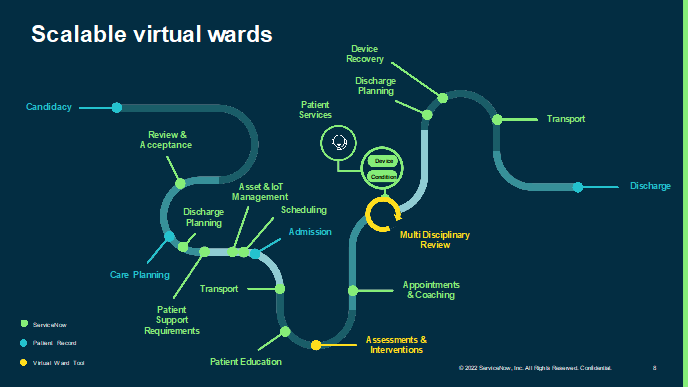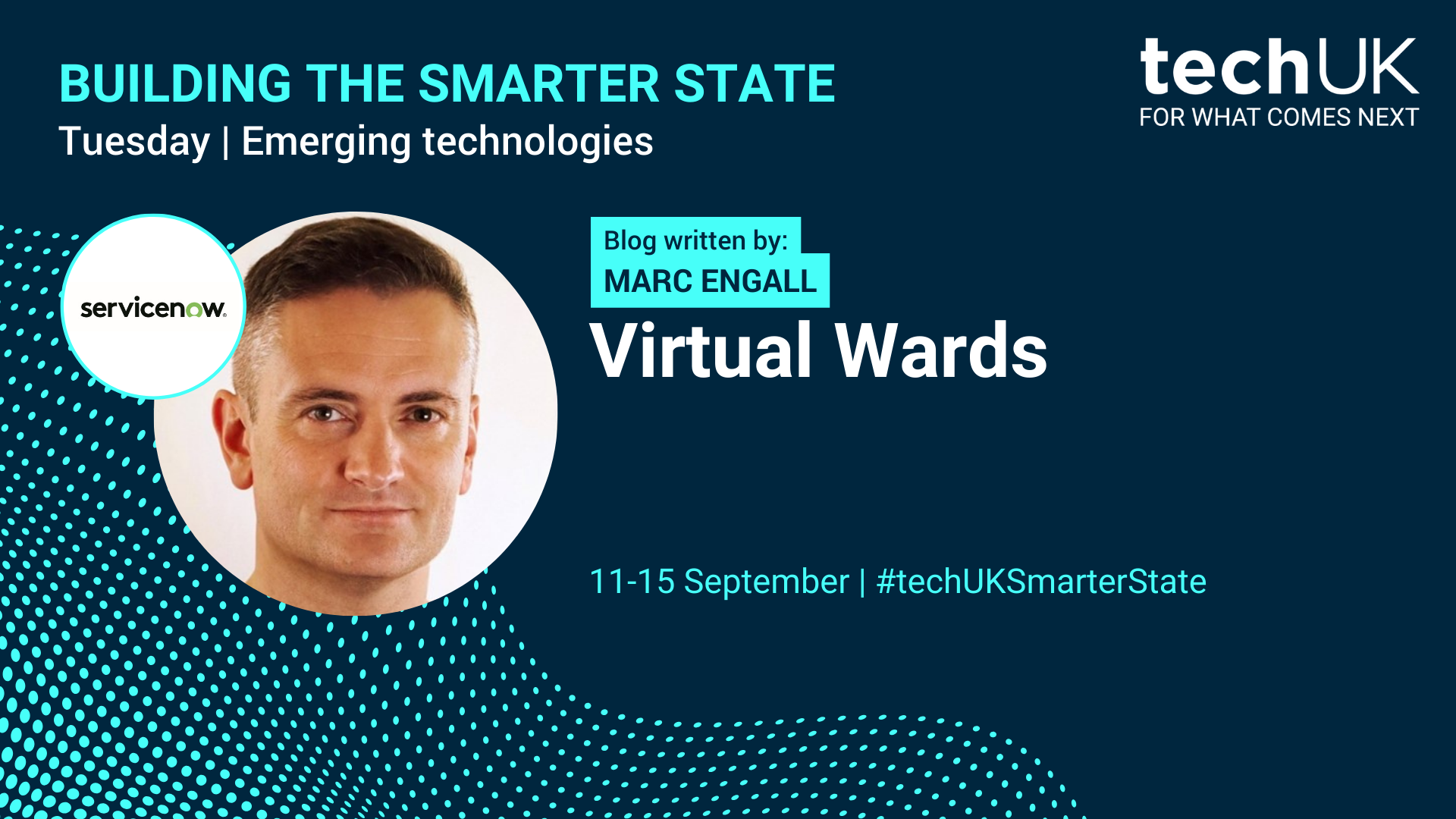ServiceNow: Virtual Wards #techUKSmarterState
Enabling Better Patient Outcomes Through the End-to-End Orchestration and Management of Virtual Wards
Though critically important to us all, health and welfare have not always been considered as prime candidates for smart state digital transformation. Services delivered are fundamentally physical, face-to-face encounters, lacking some of the opportunities for driving improved efficiency and experience via technology.
Yet all this is changing rapidly, with the NHS in particular realising the opportunity post-COVID to use smart technologies to transform and deliver significant and immediate value across all its stakeholders. At the vanguard of these developments are Virtual Wards – an innovative operating model combining several sophisticated technologies to solve a costly operating problem and improve the in-patient experience.

The strain imposed on our National Health Service is evident, exacerbated by an increasing aging population, significant resource and cost constraints, and the backlog caused by COVID. Consequently, many patients who require care and treatment, but for whom hospitalisation is neither a preferred nor required option, are currently occupying much-needed hospital beds because there is currently no alternative means to manage their care outside of a hospital environment. This is expensive for the NHS, negatively impacting the backlog and severely impacting those patients’ quality of life.

A Virtual Ward is a remote service that enables clinicians to manage patients’ healthcare and on-going treatment safely at home, under the continued supervision of their allocated health professionals and specialists. There are huge potential upsides to this approach not just in terms of cost and capacity for the NHS itself but fundamentally for the patient outcomes the service exists to deliver. Put simply, Virtual Wards enable more patients to receive the care they need in the place they would choose to be, their own home.
Virtual Wards rely heavily on technology and data systems to facilitate remote monitoring, communication, and management of sensitive and time-critical data in real time.

We highlight four key areas where technology provides the transformative magic to make Virtual Wards possible:
- Managing, tracking, and coordinating assets: From IoT-enabled diagnostic equipment to simple yet essential, walking frames and bed pans, there is a lot of equipment required in a hospital. Consider then the management of this range of equipment across each and every patient’s home, ensuring they are serviceable, available and transferrable. The possibilities for it to be lost, damaged or simply unaccounted for is enormous – and that can be both expensive and potentially harmful for a patient’s recovery.
- Ensuring continuous two-way patient engagement: When patients are cared for at home, it is vital they can access help and support, both clinical and administrative, quickly and reliably. This is the major benefit of being in hospital. But as many hospitals are finding, being able to call a nurse is not always appropriate or possible. What if there was a way to use technology to properly analyse, prioritise and then direct these enquiries either to those best able to help or even to enable patients to self-serve and resolve their own queries? There is a wealth of knowledge, workflow expertise and collaboration technology that can be utilised to give patients better and more appropriate communications from the comfort of their own home, leading to better patient outcomes and efficiencies.
- Combining face-to-face contact with technology: As we know, sometimes only a personal contact with a fellow human will do – whether that is for changing a dressing or physically updating some equipment. Coordinating these visits is deeply complex, as one practitioner is likely to have several visits to make, often needing different equipment, skills and consumables at each visit and often needing to dynamically manage timings and routing as situations change. Once again, the technology that has helped optimise these processes in other industries and support functions can be applied and enhanced to best fit the needs of patients in a Virtual Ward. Can you imagine the complexity of trying to architect this type of solution from scratch? And this is just one part of the much bigger Virtual Wards puzzle. Again, this is where smart innovation from other industries and use cases can be applied by workflow experts to help craft an optimal Virtual Wards solution.
- Orchestrating end-to-end patient journeys in a Virtual Ward: The complexity of a patient’s journey through a Virtual Ward should not be underestimated. To bring this to life we illustrate a likely journey in the diagram below, in which we can see many touch points that will need careful planning and coordination.

Virtual Wards offer a pragmatic and extensible solution to address many of the pressures currently facing the NHS. They have particular applicability to more vulnerable groups who may be at greater risk of health inequalities, such as older patients or patients with disabilities, who are more likely to report difficulties engaging with services through traditional in-person / acute hospital channels. They are a great example of how smart technology can be used to improve patient outcomes, enhance patient experience, and optimise the use of limited healthcare resources.
ServiceNow is a cloud-based digital transformation and management platform that helps digitise and unify organisations so that they can find smarter, faster, better ways to make workflow, enabling their customers (“patients”) and employees to be more connected, more innovative, and more agile. ServiceNow is recognised as a leader by Gartner and Forrester across a multitude of capabilities, including low-code application development, IT and enterprise service management, customer service management, risk management, digital process automation and value stream management.

Marc Engall is Senior Solutions Sales Executive for Customer Workflows, UK&I Public Sector at ServiceNow. Contact Marc at [email protected].
From 11 – 15 September techUK is running our annual Building the Smarter State Week in the run-up to the ninth edition of our flagship public services conference, Building the Smarter State, on Wednesday 27 September. Book your tickets here.


